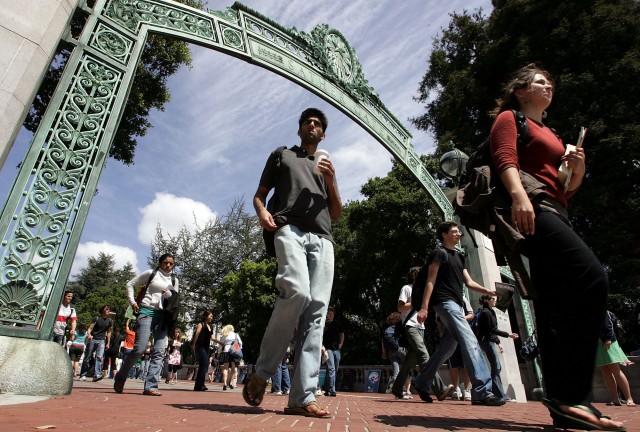The proposal comes after a vote by UC regents last month to approve a plan that could boost tuition by 5 percent a year for the next five years if the university system doesn't get the money it says it needs from state lawmakers.
Senate Constitutional Amendment 1 would make it crystal clear: UC's 10 campuses and its governing board would be "subject to legislative control as may be provided by statute." The legislation would also allow the governor and legislators to remove sitting UC regents before their 12-year terms expire. Having said all of that, the hurdles to actually making this happen are high: The bill would need a supermajority vote of support in both the Assembly and Senate, and then approval by voters as a ballot measure in 2016.
And again, what's fascinating is how many times the same kind of angst has come -- and gone -- over UC's constitutional autonomy. Its sibling system, the California State University, does not enjoy the same kind of elevated status. Only five other university systems in the United States have some legal independence from the political muscle of their respective legislatures and governors, with only that of the University of Michigan coming close to that given to UC.
Just roll back to the clock to 2009 if you want to find the last big push in Sacramento to zap the University of California's constitutional status. Then, it was also a fight over tuition and fees paid by students -- sprinkled with a dash of what lawmakers thought were overly generous salary and benefit packages being given to UC executives. One of the state senators involved in that effort derided the University of California's leadership as running a "fiefdom" that wasn't accountable to the public.
And before that, historians will point out how picking a fight with one UC campus helped a washed-up actor become governor. Ronald Reagan's promise to "clean up the mess at Berkeley" and its anti-war protests helped him win the 1966 gubernatorial campaign against Gov. Pat Brown. Once in office, Reagan pressured UC regents to fire Berkeley's chancellor, Clark Kerr. That would have been a lot easier under the new SCA1, given that it calls for regents to be removed by state lawmakers before their terms have ended.
No doubt another governor, Gov. Pete Wilson, would have also liked to have that power in 1995 -- when he lobbied UC regents to dismantle affirmative action policies at the university.
Peter Schrag, one of California's most celebrated political writers, was a critic of the 2009 plan to do away with UC's autonomy, pointing out at the time previous threats from state lawmakers to academic freedom -- most notably, during the anti-Communist campaigns of the 1950s. Schrag thinks this new attempt is the wrong approach, too.
"UC's constitutional autonomy has been very useful," said Schrag earlier this week. He agrees that the university has often hurt its independence with "self-serving practices, pretensions, and a lot of budgetary fudging," but argues the UC independent-or-not-independent debate is really just part of a much larger issue.
"That's the inherent tension between the meritocratic and the democratic values of public higher education," said Schrag. "Places like Berkeley, UCLA and [UC] San Diego are particularly afflicted by that tension. It's not often pretty, but I'm still surprised by how well the selective UCs have walked that line."
Nonetheless, the tension between the political and academic worlds is again on the rise. There are signs that, while publicly sizing each other up for a fight, lawmakers and UC's top brass realize that neither can outmuscle the other, and the legislation could simply be meant as a shot across UC's bow.
Still, UC leaders face real pressures from Sacramento, including a new call from Assembly Speaker Toni Atkins (D-San Diego) for a line-item review of the entire system's expenditures. And while UC still has its constitutional freedom, Brown and legislators could -- if things really got bad -- invoke a nuclear option: simply decrease UC's budget by the amount the regents increase tuition, a dollar-for-dollar cut. After all, while the university has independence in how it spends money, it still needs the state to actually give it the cash.
